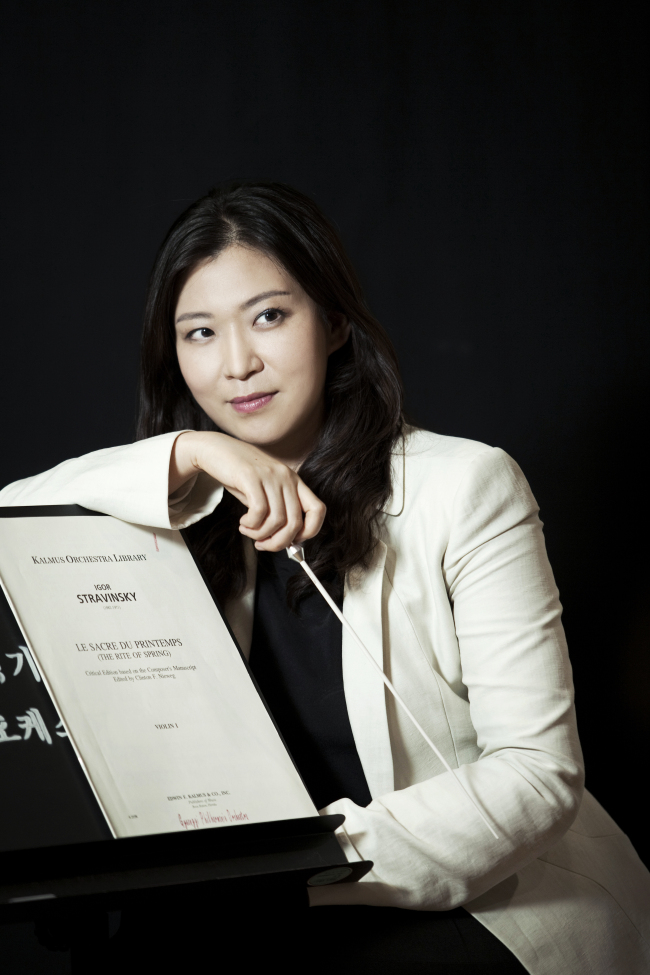If one is asked to picture a classical music conductor, it is safe to say that more often than not, the image which immediately springs to mind is that of an older male in a freshly pressed black-and-white tuxedo gently waving a baton.
However, thrashing past these outdated stereotypes is 38-year-old maestro Sung Shi-yeon, who is making waves in the classical music world as a notable upcoming, young female conductor.
Although her career has only just taken off, Sung has already received a number of prestigious awards including the top prize at the 2006 Sir Georg Solti International Conductors’ Competition in Frankfurt, Germany. While the win by itself was already an impressive achievement, the honor was compounded by the fact that Sung was the first woman to ever receive the accolade.
Since winning the award, Sung has quickly gained recognition as one of the most exciting and young conductors on the international scene. In 2007, she became the first woman to be named assistant conductor of the Boston Symphony Orchestra, working under the renowned James Levine. In the summer of 2010, she finished her three-year role as assistant conductor in Boston and returned to Korea, where she was appointed as Associate Conductor of the Seoul Philharmonic Orchestra, a post created specifically for her.
Earlier this year she added to her already long list of accomplishments by becoming the first female to lead a major orchestra, taking the podium as the Gyeonggi Philharmonic Orchestra’s chief conductor.
“I am obviously a different gender than most conductors and I think that it is something that really piques people’s interest when they first see me,” Sung said during an interview with The Korea Herald. “However, although I can feel people’s curiosity (about me being a female conductor), I personally don’t put any thought into the subject of my gender.”
 |
| Conductor Sung Shi-yeon of the Gyeonggi Philharmonic Orchestra (Korea Mecenat Association) |
“My age and my gender are the two things that I wish people did not place too much focus on about me,” the conductor added. “In the end, the job of a conductor is to have the music of the orchestra reach the audience and to take the ideas behind the pieces and bring understanding and joy to the people listening. For these reasons, I think the emphasis should be on the music.
“Classical music has no gender distinction. Even some of Beethoven’s symphonies were composed when he was just a kid … so in the end, age shouldn’t matter in music either.”
Despite her desire to have her work be mutually exclusive of her image, Sung admits that a conductor’s image is important. She has become accustomed to talking about how she should do her hair, what she should wear and even how she should walk onto the stage. However, aside from the obvious biological aspects, Sung says that unlike some maestros, she tends not to be too liberal and outlandish in her conducting style.
“One of the aspects that I think makes me different from some composers is that I tend to be very conservative,” she added. “I am not one of the maestros who gets physically into the music while conducting, rather I tend to put a tremendous amount of thought and concentration into what I’m doing and hope the audience can sense my sincerity.”
How it all began
Born in Busan, Sung began playing the piano at the tender age of 4, stating that although she came from a family that had absolutely no musical background, one day after playing outside with her friends, she simply returned home and asked her mom if she could start learning to play the piano.
After attending a music high school in Korea, Sung went on to study the piano as an exchange student in Switzerland and Germany. However, it wasn’t until the age of 25 that the young pianist decided to pursue other musical interests.
“While I was in school my professors suggested that instead of solely concentrating on the piano as my only musical instrument, I should broaden my horizons,” she explained. “So I thought to myself that as a conductor, it would be a great opportunity for me to be able to immerse myself in a wider range of musical spectrums. Although I wasn’t exactly young at the time, I thought it was time in my life for a change.”
After that, Sung decided to leave behind her passion for the piano and rededicated her life to a new career path as a conductor. Little did she know that the move would lead her down the path of being considered as one of the most exciting maestros in international classical music.
Gyeonggi Philharmonic
It has been ten months since Sung took charge as chief conductor of the Gyeonggi Philharmonic Orchestra. The conductor said that she has spent most of this year implementing technical and policy changes, and it is her hope that during her time in the new position she will be able to reach a new level of musicality with the orchestra.
“One of the things that I love about our musicians is that we know we are not the largest or the best orchestra. However, as an orchestra we play with such humbling passion,” the conductor said. “I truly think this is the Gyeonggi Philharmonic Orchestra’s best quality and I hope that even in the future, we never lose this aspect of ourselves.”
Gyeonggi Philharmonic Orchestra under Sung’s baton will be staging its latest production, “Identifying with the Generation,” at the Seongnam Arts Center’s Concert Hall in Gyeonggi Province on Nov. 2.
By Julie Jackson (juliejackson@heraldcorp.com)



